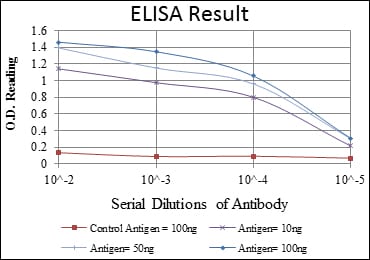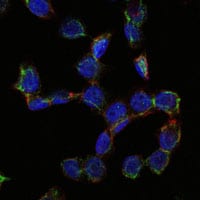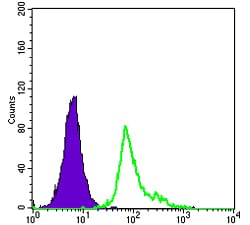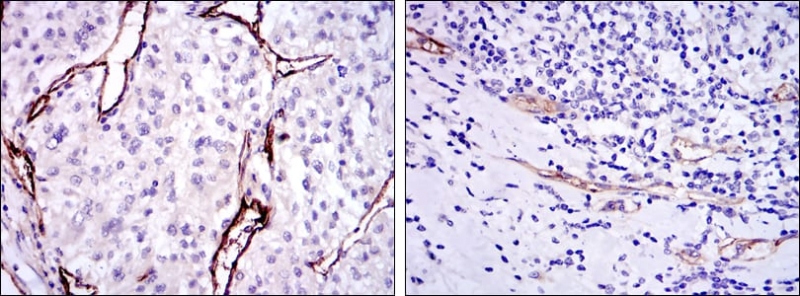



| WB | 咨询技术 | Human,Mouse,Rat |
| IF | 咨询技术 | Human,Mouse,Rat |
| IHC | 1/100-1/200 | Human,Mouse,Rat |
| ICC | 技术咨询 | Human,Mouse,Rat |
| FCM | 咨询技术 | Human,Mouse,Rat |
| Elisa | 咨询技术 | Human,Mouse,Rat |
| Aliases | ENG; END; ORW; HHT1; ORW1; CD105; FLJ41744 |
| Entrez GeneID | 2022 |
| clone | 3A9 |
| WB Predicted band size | 71kDa |
| Host/Isotype | Mouse IgG1 |
| Antibody Type | Primary antibody |
| Storage | Store at 4°C short term. Aliquot and store at -20°C long term. Avoid freeze/thaw cycles. |
| Species Reactivity | Human |
| Immunogen | Purified recombinant fragment of human CD105 expressed in E. Coli. |
| Formulation | Purified antibody in PBS with 0.05% sodium azide. |
+ +
以下是关于Klotho抗体的3篇代表性文献的简要总结,供参考:
---
1. **文献名称**:*Anti-Klotho Antibody Induces Endothelial Dysfunction via Klotho Deficiency in Mice*
**作者**:Yamamoto M, et al.
**摘要**:该研究通过注射特异性Klotho抗体中和小鼠体内Klotho蛋白,发现Klotho缺失会加剧血管内皮功能障碍,提示Klotho抗体可能通过抑制Klotho的抗炎和抗氧化功能参与心血管疾病的发生。
---
2. **文献名称**:*A Monoclonal Anti-Klotho Antibody Reveals Plasma Membrane Localization of Endogenous Klotho Protein in the Kidney*
**作者**:Chen CD, et al.
**摘要**:研究开发了一种高特异性单克隆Klotho抗体,用于检测肾脏组织中Klotho蛋白的定位,证实Klotho主要表达于肾小管细胞膜表面,为后续疾病标志物研究提供了工具。
---
3. **文献名称**:*Therapeutic Targeting of Klotho with Monoclonal Antibodies Improves Cognitive Decline in a Mouse Model of Alzheimer’s Disease*
**作者**:Dubal DB, et al.
**摘要**:利用Klotho激动型抗体治疗阿尔茨海默病小鼠模型,发现其能通过激活Klotho相关信号通路改善认知功能,表明Klotho抗体在神经退行性疾病中的潜在治疗价值。
---
如需获取全文,建议通过PubMed或Sci-Hub输入文献标题或作者信息进行检索。
Klotho antibodies are tools used to study the Klotho protein, a key player in aging and age-related diseases. Named after the Greek goddess of fate, Klotho was initially identified in 1997 as an anti-aging factor. The protein exists in two forms: membrane-bound and soluble. Membrane-bound Klotho acts as a co-receptor for fibroblast growth factor 23 (FGF23), regulating phosphate and calcium homeostasis in the kidneys. Soluble Klotho, shed from the membrane form, circulates systemically and exhibits pleiotropic functions, including antioxidant, anti-inflammatory, and metabolic regulatory effects. Reduced Klotho expression is linked to chronic kidney disease, cardiovascular disorders, neurodegeneration, and accelerated aging.
Klotho antibodies are essential for detecting protein levels in tissues or biological fluids, enabling research into its distribution, regulation, and mechanistic roles. They are widely used in techniques like Western blotting, immunohistochemistry, and ELISA. Therapeutic applications are also emerging, with some antibodies designed to enhance Klotho signaling or block its degradation. Recent studies explore their potential in treating conditions like renal fibrosis, Alzheimer’s disease, and hypertension by restoring Klotho-deficient pathways. However, challenges remain in optimizing antibody specificity, delivery, and clinical translation. Despite this, Klotho antibodies remain critical for unraveling the protein’s complex biology and advancing therapeutic strategies targeting age-related pathologies.
×